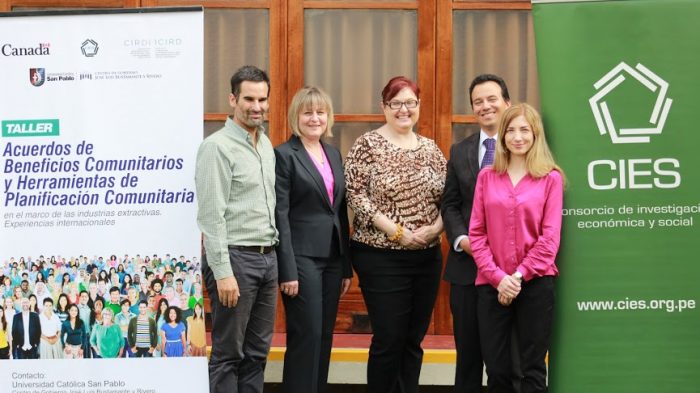CIRDI fosters collaborative spaces for learning, action research, and innovation
Jun 12, 2015

From left to right: Jose Carlos Silva Macher, Environmental Management Advisor, Consortium for Economic and Social Research (CIES) Consorcio de Investigación Económica y Social (CIES); Kristina Henriksson, CIRDI Senior Advisor and Adjunct Professor at the Beedie School of Business; Gretchen Hernandez, Post Doctoral Fellow and International Projects Coordinator with the Centre for Sustainable Community Development at SFU; and Carlos Fernando Timaná Kure, Professor, San Pablo Catholic University Universidad Católica San Pablo/ Sabina Mlodzianowska, and Research Associate at the Beedie School of Business.
How can cross-sector partners in developing countries come together to find new solutions to complex issues related to extractive activity, sustainable development, wellbeing, and poverty reduction?
A team at CIRDI, an interdisciplinary, research Institute coalition of the University of British Columbia, Simon Fraser University, and École Polytechnique de Montréal, believes innovative solutions to questions like this will best surface in a collaboratory – where policy makers, researchers, entrepreneurs and leaders from governments, communities, NGOs and resource companies can come together to compare ideas and experience.
“The collaboratory idea, or Co-Lab, is a blend of ‘collaboration’ and ‘laboratory’, and draws on a growing number of university-based social innovation/change labs around the world that try to address global development challenges in new ways,” says Dr. Kristina Henriksson, senior advisor with CIRDI and adjunct professor at the Beedie School of Business.
In April, with partners in Peru, the CIRDI team began implementation of a program that will foster collaborative spaces for learning, action research and innovation.
The Peru Collaboratory will bring together partners in new forms of collaboration across sectors to learn, experiment and investigate. Together they will question what is being done in this area? How well are the initiatives working – or not? What are best ways to measure impacts, and amplify solutions that work?
Recent studies have determined that despite millions of dollars spent on initiatives designed to improve livelihoods and inclusive growth in extractive communities and regions, impacts on wellbeing and poverty reduction are difficult to measure and the potential positive contributions are not straightforward.
The CIRDI team will also build capacity with local universities for engaged development work and innovative partnerships. “Local Peruvian universities and learning institutions are key partners in this initiative,” says Henriksson. “These institutions have been underutilized as knowledge hubs and convenors to help drive change and sustainable outcomes. The most common reason for this is the lack of local capacity – that’s a shared issue both here in Canada and in other countries.”
The universities from the two countries will work together to identify and implement research and problem- and opportunity-based Co-lab projects with partners. “We are not there to do it ourselves, we are there to strengthen their capacities – and to learn from our Peruvian colleagues with the goal of expanding the collaboratory approach to other communities and countries,” says Gretchen Hernandez, international project manager with SFU’s Centre for Sustainable Community Development and a collaborator in the program.
CIRDI is an interdisciplinary, coalition‐based research Institute (University of British Columbia, Simon Fraser University, École Polytechnique de Montréal) operating at a global level in the area of resources and development – assisting developing countries in their own efforts to leverage the potential of their minerals sectors for economic development, sustainable livelihoods and inclusive growth.
Through CIRDI, SFU and the Beedie School faculty and students engage with a global community of institutions and organizations – Universities, NGOs, government agencies and corporations – that are dedicated to improving responsible resource governance and management practices in emerging markets, within the context of ever-increasing global sustainability challenges.
For more information on CIRDI, visit cirdi.ca
